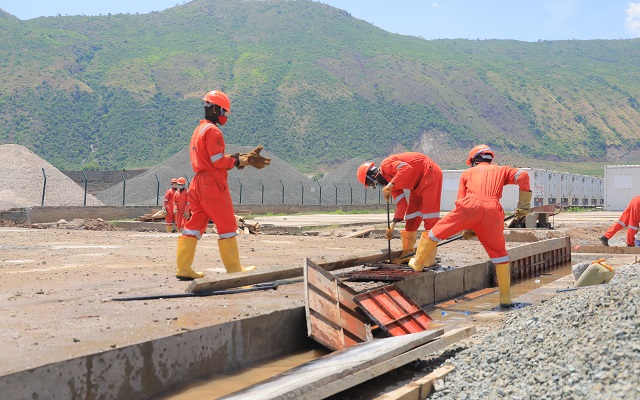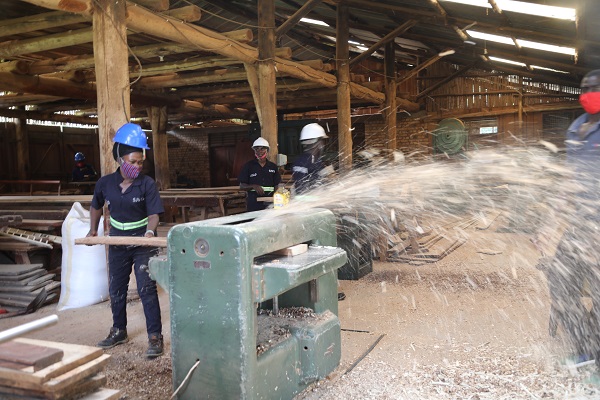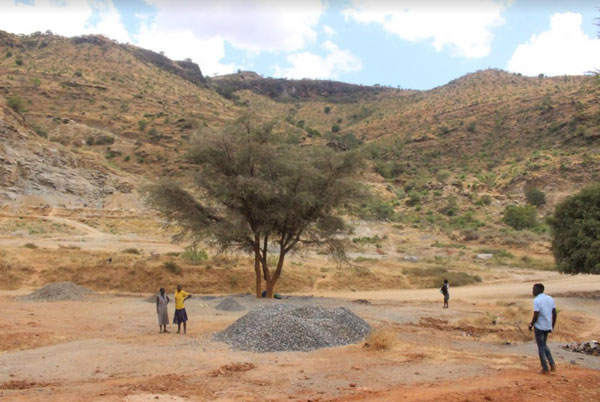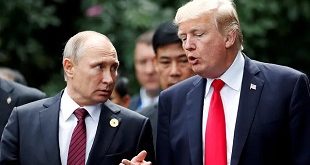
Visiting transparency body says government should give citizens more information
Kampala, Uganda | RONALD MUSOKE | Representatives of civil society organisations working in Uganda’s extractives sector (oil, gas and mining) want money and more freedom to check on the government’s pledge to be transparent and accountable to Ugandans.
That is what emerged from a recent visit by a team from the International Secretariat of the Extractives Industries Transparency Initiative (EITI) based in Oslo, Norway. The team was in Kampala from Dec.04-08 to assess Uganda’s implementation of the Extractives Industries Transparency Initiative (EITI) standard in a process known as “validation.”
“Every three years, EITI members are validated on how well a member is adhering to the EITI standard and which areas require further strengthening. That is why we are undertaking this process,” said Gloria Mugambe, the head of the Uganda National EITI Secretariat.
The EITI is a global standard that seeks to promote the open and accountable management of natural resources in member countries. It also seeks to strengthen government and company systems, in form of public debate with the hope of enhancing public trust.
Francisco Paris, the Regional Director at the EITI International Secretariat who led the team for the engagement in Kampala told The Independent they met with officials from government agencies including; the Uganda EITI Secretariat, the Office of the Auditor General, the Petroleum Authority of Uganda, the Uganda Revenue Authority, the Ministry of Energy and Mineral Development, and the Ministry of Finance, Planning and Economic Development.
On the importance of implementing EITI standards, Paris told The Independent that it is critical for Uganda to learn from countries like Venezuela– where he comes from.
“In Venezuela (just like Uganda has done), institutions were well designed but when it came to implementation, the political decisions and political dimensions overpowered the good design and we ended up not having any savings (sovereign investment fund).”
Paris told The Independent that addressing the issue of ‘saving for the rainy day’ when the country gets an oil windfall is important because oil prices fluctuate all the time. “You will have good years and you will have bad years,” Paris said.
EITI Secretariat engages local CSOs
In the ongoing conversation of having an EITI process that fits within the local context, Paris said what matters for Uganda is that the oil money ultimately benefits ordinary citizens.
“Within the context of the work we do at the EITI Secretariat, we put this information out there using the EITI platform and we want it to be used for dialogue; the press, and for parliament to openly talk about the issues in the extractives industry because at the end of the day, you need to get a wide range of decisions right.”
“The lessons are all out there for Uganda to learn from and the EITI is there to help Uganda make those decisions but also to expose the temptations,” he told The Independent, “There are many cases in history where oil money has been used to build white elephants and create bloated bureaucracies.”
Uganda’s EITI bid
Uganda was admitted to the EITI fold in August 2020. The government said at the time it wanted the EITI to help it improve the governance of its extractive industries sector by enhancing transparency in the sector to promote good governance and accountability to ensure effective collection, optimization and allocation of revenues.
Jessica Sanchez, the technical officer at the International EITI Secretariat was also part of the team in Kampala. She told The Independent the objective of the EITI validation process is to understand if the EITI implementation in Uganda is fit for purpose.
“We are consulting the different stakeholders (government agencies, civil society and industry players) and we are having different conversations asking them specific things related to the EITI requirements vis a vis the local context,” she said, “Based on the information (we receive), we shall write a report and it will be reviewed by the EITI Board and then it will be published next year.”
Civil society decry shrinking civic space
A recurring thread in the dialogue between the local civil society and the International EITI Secretariat team was the concern about the ever-shrinking space for civil society organisations (CSOs) in the country which is restricting their activities.
Joy Akoli, the Programmes Director at Global Rights Alert recalled how three months ago, her team travelled to the oil-rich Buliisa District in western Uganda for a meeting which the Resident District Commissioner (RDC) attended.
She told the team: “Before we could start (the meeting), the RDC asked the LCV Chairperson for the list of NGOs that they have been asked to pay attention to. He perused through the elaborate list and then at the end he said, ‘you are safe, you’re not on the list of certain organisations that are of interest to the government.’”
Benon Tusingwire, an elderly grassroots campaigner who heads the Navigators of Development Association (NAVODA), a grassroots Community Based-Organisation based in the western city of Hoima who has witnessed Uganda’s oil journey right from its discovery in 2006 offered more details of the engagement between the government and civil society.

He said in the beginning, the government was skeptical and dismissive of civil society’s involvement in the oil and gas sector. “Today there is recognition of the civic space (but) there are occasional challenges between civil society and security agencies,” he said, “Sometimes they stop some of our work.”
“We do have the issue of civic space; in the EITI Boardroom we have the tripartite constituencies of government, companies and civil society but the shackles on civil society are not helping us,” said Bashir Twesigye, the executive director of the Civic Response for Environment and Development (CRED) who is also the current chair of the Civil Society Coalition on Oil and Gas (CSCO), a consortium of 60 grassroots, national and international CSOs that seeks to promote good governance of Uganda’s oil and gas resources.
Twesigye also spoke about the dwindling financial resources that has affected their EITI-related activities. “We don’t have a budget for EITI activities and organisations struggle here and there to do activities around EITI,” he said.
Siragi Magara, the Extractives Industries Coordinator at Oxfam-Uganda who is also a member of the Multi-Stakeholder Group (MSG) in Uganda’s EITI fold noted that funding has shrunk markedly following the disbandment of the Democratic Governance Facility (DGF), a donor-led funding facility which used to support the sector with substantial grants.
The other big donor, NORAD (the Norwegian Agency for Development Cooperation), which used to support local civil society activities, also ended its Oil for Development Programme in 2022.
“We have not had any grants for the last two years,” he said. “This means that our participation in the EITI process has been haphazard and unpredictable which has left the Ugandan civil society organizations to rely on handouts from individual donors.”
“We don’t have a clear programme for civil society to follow-up on EITI activities. Our participation has been hampered by the lack of streamlined funding which would enable us come up with clear interventions around the EITI process.”
“We cannot say things are okay when it’s difficult to do research to dissect those EITI reports (Uganda has so far produced),” said Robert Tumwesigye, the Coordinator at Publish What You Pay.
Tumwesigye added: “We want to independently scrutinize the EITI reports; we don’t want civil society to just endorse government reports. We want a situation where civil society is able to dissect reports done by the EITI Secretariat independently.”
Paul Mwebaze, a fellow at the Advocates Coalition for Development and Environment (ACODE) offered a possible solution around the shrinking civic space and lack of money. He said they should push for a stand-alone EITI law just like other member countries have done (Tanzania and Nigeria) or others which are considering to do so (Malawi and Sierra Leone).


In Uganda, when something is not legislated, it’s very hard to get a vote and secure funds,” said Mwebaze, “A separate law on EITI would ensure that resources and institutional frameworks are in place.”
“Currently Uganda’s EITI Secretariat is hanging (under Ministry of Finance and is not fully funded); and it only depends on tokens. If a law was put in place, we would have a specific institutional framework with a specific vote to implement EITI activities in Uganda.”
“We think that the quickest solution to obtain funding for EITI activities by government is through securing a vote in the national budget and that can only be made possible by legislating a law,” said Mwebaze.
But, Bbiira Kiwanuka Nassa, the Executive Director of Recreation for Development and Peace-Uganda, a local NGO based in Masindi in western Uganda objected to an EITI law.
“We may not need the law, especially if it is only going to put in place a bureaucracy. What’s important is for civil society to continue and impress upon the government the fact that opening up is a very good practice,” Bbiira said.
“Once the government appreciates that fact, the government will definitely allocate money for EITI activities. Wherever the government has always got interest they have always put money there,” Bbiira said.
Edwin Wuadom Warden, who supports Anglophone African countries to implement EITI and is in charge of Uganda agreed with Bbiira. He noted that experience from countries that already have EITI legislation has shown that there is a self-contradictory effect.
“We have realised that legislating an EITI law can have a downside to it whereby it can be turned into a semi-autonomous or quasi government entity which then loses its potency as a multi-stakeholder platform,” Warden said, “Would legislating the EITI in Uganda ensure the sustainability of the EITI process but also protect civic space? What we have now, will it get better or would it actually shrink civic space in the country?”
The EITI Standard
Launched in 2002, the EITI seeks to reduce corruption in the oil, gas and mining sector by asking governments and companies to release publicly details of money coming in and how it is spent. The initiative grew out of the “Publish What You Pay” campaign which is a global network of civil society organisations campaigning for transparency in the extractives industry.
This transparency on both sides of the business relationship is expected to deter corruption and therefore, increase the likelihood of money being earned and spent in ways that contribute to social and economic well-being.
In becoming an EITI member, Uganda agreed to meet sign-up requirements. In addition to saying publicly that it intends to implement EITI, the government has committed to work with civil society and companies on the implementation process, appoint a senior individual to lead the EITI implementation and establish a multi-stakeholder group to oversee the implementation.
The multi-stakeholder group includes but is not limited to–the private sector, civil society (not only NGOs but also the media and legislators) and government agencies.
In each of the 57 EITI member countries from Africa, Asia, Europe and the Americas, implementation is overseen by a Multi-Stakeholder Group (MSG) comprising government representatives, extractive company officials and civil society organisations working together.
The EITI Standard sets out the requirements which member countries should meet to be recognised, first as EITI candidates and subsequently as being compliant. The standard is overseen by the EITI Board.
In Uganda, the Multi-Stakeholder Group (MSG) comprises 25 members. It includes; five representatives from civil society organizations, seven from extractive companies and 13 from the government. Each of these members has a proxy who represents them in MSG activities in case of their absence. The MSG is supposed by a Secretariat (UGEITI) which undertakes the implementation of EITI activities on a day-to-day basis.
Advocates of the EITI say the mechanism can provide communities that live near extractive sites with details of the financial contributions that the industry makes and enable citizens, legislators, civil society groups including the media to hold governments to account for how the revenues are spent.
Project-by-project reporting under the EITI, experts say, is beneficial to the companies too because it strengthens companies’ “social licence” to operate by showing host populations the financial contribution they make to public revenues which in turn reduce the likelihood of resentment and conflict.
According to Global Witness, a London-based non-profit that advocates for transparency in the extractives sector around the world, over 50 countries are now implementing the EITI and 80 of the world’s largest oil, gas and mining firms also actively participate in the initiative.
The EITI has also won the support of over 80 global investment institutions that collectively manage assets worth about US$ 19 trillion. Global Witness adds that since its inception in 2002, companies have disclosed over US$ 1bn in revenue payments through EITI reports.
Gloria Mugambe, the head of the Uganda National EITI Secretariat says Uganda’s extractives sector is still plagued by “a lot of mystery and question marks in the sector.”
“What minerals do we have? What companies in the country are working in the extractives sector? How much money does the government earn from Uganda’s extractives industry? All these questions (in the past) have had rhetorical answers,” she said.
“But what we are now driving towards as members of the EITI is to make this information clear, accurate and definite such that if any Ugandan wants to know which minerals Uganda has and where they are, it is easier for them to access that information.”
“Our job at UGEITI is to make this information accessible and once it is accessible, to make it relevant for the Ugandan people so that Ugandans can easily find its relevance.”
Mugambe says her secretariat produces an annual report which contains information that relates to the requirements of the EITI standards. “It takes specific criteria for how the extractives sector should be governed across the extractives value chain; from exploration, production to how the revenue sharing should be done.”
 The Independent Uganda: You get the Truth we Pay the Price
The Independent Uganda: You get the Truth we Pay the Price



